It's no longer useful" .. Al-Sadr cancels "expected million-man demonstrations" in Baghdad
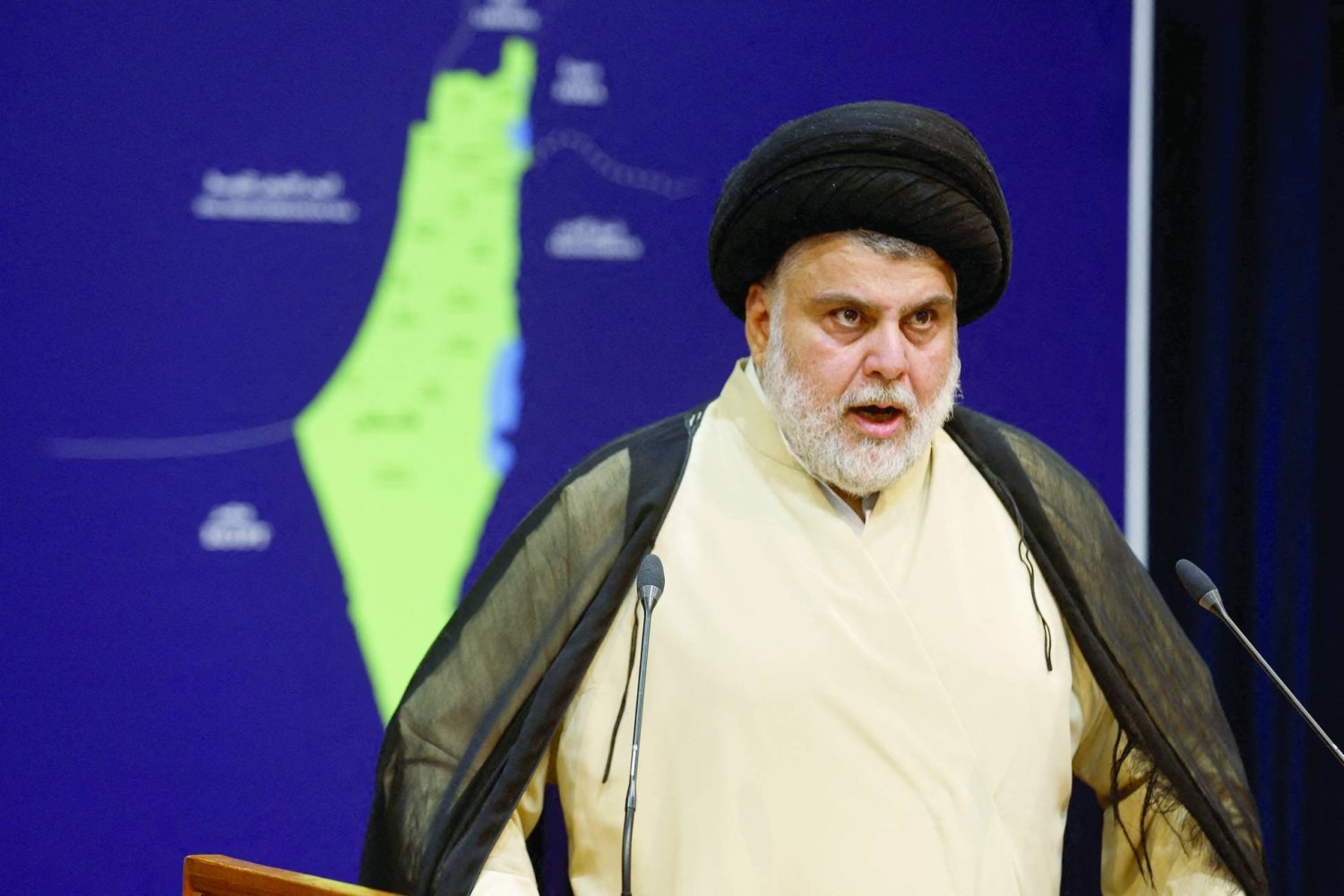
The leader of the Sadrist movement, Muqtada al-Sadr, decided today, Wednesday, September 18, 2024, to cancel the "expected million-man demonstrations" in the capital, Baghdad.
The video for this blogpost is below here:
Al-Sadr said in a tweet on the (X) platform: “After the Zionist recklessness and terrorism in Palestine and Lebanon, with the public cover of the great evil America, and their failure to respond to international resolutions and humanitarian appeals, and their disregard for the voice of the peoples rising up against the systematic Zionist-American terrorism that wants to drag the entire region into a war of extermination, I find it logical to cancel the expected million-man demonstrations.”
Al-Sadr attributed the cancellation of the demonstrations to the fact that they “are no longer useful after all these Israeli attacks against the people.”
"The demonstrations are not at the level of a major event," he added.
Warnings against relying on the “rentier economy”: Use effective systems and digital infrastructure - Urgent
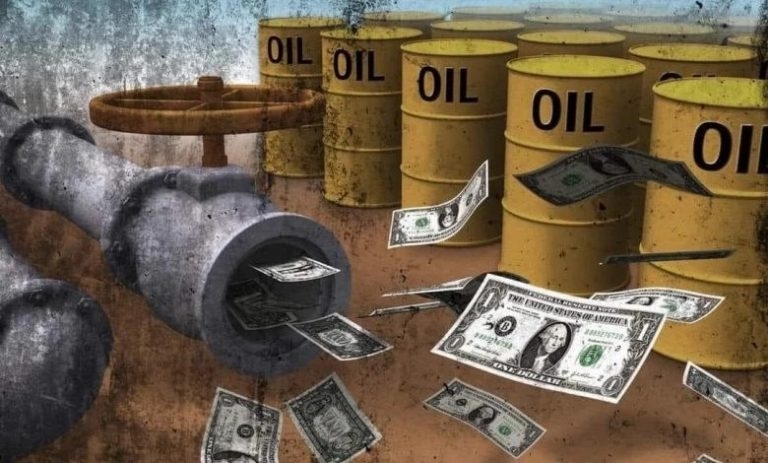
Today, Wednesday (September 18, 2024), the economic and financial expert, Nawar Al-Saadi, warned of the danger of Iraq continuing with a rentier economy, while providing solutions to overcome the danger of this matter.
Al-Saadi told Baghdad Today that “the Iraqi economy is considered a rentier economy par excellence, as the state depends on oil revenues to finance its general budget by up to 90%,” indicating that “this type of economy is naturally exposed to severe risk when oil prices fall in global markets, which prompts the government to search for additional sources of income to avoid future financial crises, and imposing taxes is considered a step within the government’s attempts to create new sources of income from non-oil sectors, and this is in line with the reforms that the government has recently proposed with the aim of diversifying the Iraqi economy.”
He added that "the government's success in implementing these policies remains dependent on the ability to address the main challenges that hinder economic reforms, most notably the widespread corruption in many government sectors, and the bureaucracy that burdens the reform process," stressing that "the government needs to develop effective systems for collecting taxes from new sectors, in addition to providing the necessary digital infrastructure to support this transformation."
Al-Saadi said, “In the long term, if the government succeeds in overcoming these challenges and develops effective and sustainable strategies to collect taxes from various sectors, it may be able to create sustainable sources of income that help reduce excessive dependence on oil, which contributes to the stability of the Iraqi economy, but it requires strong political commitment and comprehensive institutional reforms to achieve this.”
Economic expert Nabil Al-Marsoumi confirmed on Wednesday (September 11, 2024) that the fair price of oil is the one that achieves the interests of producers and consumers together.
Al-Marsoumi said on his Facebook platform, which was followed by "Baghdad Today", that "the fair price of oil is the one that achieves the interests of producers and consumers together, that is, the price that achieves good financial revenues for producers that enable them to return part of it to renewing and increasing oil production capacities."
He added: "It also enables consumers to obtain oil at reasonable costs that facilitate economic growth in it," explaining: "The price can be determined in the seventies as a fair price for both parties, but when the price falls below $70, it achieves the interests of consumers because it enables them to obtain energy at a cheap cost and thus reduce the prices of production inputs and increase the competitiveness of their produced goods."
He continued: "But on the other hand, it is harmful to the producing countries because it reduces their oil revenues and discourages investment in developing oil production. Conversely, when the price is $80 and up, this price is harmful to economic growth in the consuming countries and reduces the demand for oil in the long term, even though it achieves large revenues for the oil producing countries."
Oil prices are witnessing a noticeable decline, especially in futures contracts, which experts believe may affect Iraq’s rentier economy and consequently the state and the citizen.
US Ambassador: Iraq is capable of creating an economic model to be emulated

US Ambassador Alina Romansky confirmed today, Wednesday, that Iraq is capable of creating an exemplary economic model, while pointing to cooperation with Iraqi organizations to improve water access for more than 100,000 people.
Romanski said at the conference to launch the National Strategy for the Protection and Improvement of the Environment in Iraq, which was attended by the correspondent of the Iraqi News Agency (INA): "This is a pivotal and important stage that will support Iraq's efforts in building the country and the changes that are taking place today and for future Iraqi generations," noting that "this will be a vision for Iraq's requirements and confronting the environmental challenges that Iraq has faced from population growth and natural resources that have restricted development in Iraq."
She added that "drought continues to harm the agricultural sector and affects the security and safety of the country, and that this strategy is an opportunity for us to work together and unite to take action," indicating that "in the past two decades, the United States has done its work to support Iraq, enhance security and safety, and promote prosperity for all Iraqis."
She pointed out that "this year, the United States and its agents have invested more than $2,000,000 to support vulnerable communities in Iraq facing the challenges of climate change in partnership with the World Food Programme and UNICEF," noting that "through these initiatives we are trying to improve access to clean water, protect the lives of farmers, and build communities that are more resilient to climate change."
“Our programs and partnerships are producing positive outcomes, and collaboration with local Iraqi organizations and multilateral organizations is improving access to water for over 100,000 people by investing over 1,000,000 cubic meters of water, and another initiative has helped over 200,000 farmers produce thousands of tons of food and produce with less electricity and more water,” Romanski explained, noting that “we will continue to support Iraq’s development and Iraq’s sustainable goals to adapt to climate change.”
Romanski said, “In cooperation with the Iraqi ministries, we participated with ( UNDP ), and we worked together with the Iraqi government on this strategy to improve environmental protection. This includes coordination with various government agencies to effectively develop Iraq’s sustainable goals, and includes launching a strategy to help Iraq improve the balance and protect the environment, as well as an environmental protection strategy and investment in the climate.”
She pointed out that "one of our goals is to have a roadmap for a green economy that is confirmed by adequate access for women, youth and vulnerable communities facing challenges and climate change. The national strategy for protecting and improving the environment will become a guide for the United States and other donors to support the Iraqi government, and will enhance the response and solutions to be effective, including investment in the green economy and support for modern methods of agriculture, and contribute to having a more diversified economy by supporting this strategy."
She expressed her thanks to the "Ministry of Environment, the Ministry of Environment team, the US Agency, and the United Security Development Team for their assistance in launching and activating this strategy," stressing that "the role played by international supporters, donors, and local experts in including this strategy with effective participation will enable Iraq to create a better economy and will be a model to be emulated."
She explained that "the United States continues to strengthen bilateral relations and we will continue to support Iraq as we work together to enhance Iraqi sovereignty, security, safety and economic opportunities for all, and that this strategy will allow us to work together," praising "the work and this strategy, and now the real work has begun as we implement this plan to have a positive impact on the entire country."
Prime Minister: We will announce the end date of the international coalition mission in Iraq soon
Prime Minister Mohammed Shia al-Sudani confirmed on Tuesday that the announcement of the end date of the international coalition mission in Iraq will be soon, while indicating that Iraq has moved from a phase of wars to a phase of stability.
The Prime Minister said in an exclusive interview with the American Bloomberg Channel: "We will announce the date of the international coalition mission in Iraq during participation in the international conference against ISIS," indicating that "ending the mission of the international coalition in Iraq is part of the government program."
He explained that "the justifications for the presence of the international coalition have ended and there is no need for the presence of 86 countries," noting that "according to the vision and assessment, we have begun a frank dialogue with the international coalition, which included many discussions."
He continued, "Iraq respects the choices of the American people and deals with any administration that enjoys the trust of the American people, and what is important for Iraq is to activate the bilateral strategic agreement and build a relationship based on the principles written in that agreement."
He added: "I discussed the international coalition file with the US President in Washington, and we formed a bilateral committee in August of last year between military leaders to begin the dialogue," noting that "the committee reached understandings on arranging the withdrawal of the international coalition, and it was hoped that the results would be presented and announced, but the issue of ensuring that the cards are not mixed and misunderstandings were created, it was decided to postpone the announcement by participating in an international conference for the coalition against ISIS."
He pointed out that "understanding the relationship between the United States and Iran is based on common interests and mutual respect, and Iran was supportive of the political process and supportive in defeating ISIS."
He continued, "Iraq is the only country that has distinguished bilateral relations with Iran and the United States, and through that relationship we want and seek to bring the two countries' points of view closer together."
He explained: "We do not want the actions of other countries to confuse the security situation in Iraq and the region, this is our strategy in dealing with it."
He added, "Iraq today is not the same as it was in 2014, when we defeated ISIS due to the sacrifices and the stance of the Iraqi people, in addition to the support of the international community and friends. ISIS does not pose a threat to the state, and Iraq has moved from a stage of wars to stability, as the presence of ISIS as individuals hiding in caves and deserts does not rise to the level of threatening stability and security."
He noted that "the end of the international coalition's mission does not mean the end of its relationship with Iraq," stressing "holding talks with the countries of the international coalition to build sustainable security relations and economic and cultural ties."
In a related context, the Prime Minister stressed that "Iraq is an important country in OPEC and we coordinate with our partners in OPEC Plus, especially with the Kingdom of Saudi Arabia, in order to adhere to the quota or shares," noting that "Iraq is committed to voluntarily reducing oil exports to maintain prices and the interests of producers and consumers."
He continued, "Iraq has committed to compensating for the slight increase in oil production," noting that "Iraq has begun reducing local production and exports to the oil market."
He stressed that "oil exports have stopped through the port of Ceyhan after the decision of the International Court of Arbitration in Paris," indicating that "there is a legal problem related to the decisions of the Federal Court regarding oil in the region and the budget law."
He explained that "the budget law fixed the production rate at $8 per barrel, while the fixed oil production rate with the contracts of companies in the region amounted to $26."
He stressed that "Iraq has two options: either amend the contracts with the oil companies contracted with the region or amend the budget law," noting that "the oil companies contracted with the region refused to amend the oil production cost contracts."
He added that "Iraq is keen on the problem related to exporting through the port of Ceyhan, and dialogues are ongoing with the region and the oil companies to reach a solution according to the legal paths," expecting "to reach a solution during the current year."
Al-Sudani announces the imminent end of the international coalition mission in Iraq: We will deal with any American president
Prime Minister Mohammed Shia al-Sudani announced on Tuesday that the international coalition's mission in Iraq is about to end, while indicating that Iraq will deal with any new American administration. Al-Sudani said in an interview with the American Bloomberg Channel and Agency: "Iraq is an important country in OPEC and OPEC Plus and is committed to reducing its oil production, and we are committed to OPEC's decisions in a way that maintains oil prices and the equation between the interests of producers and consumers."
He added: "We have two options regarding exporting oil through the port of Ceyhan, either amending the contracts, which was rejected by the companies contracting with the region, or amending the budget law, and this matter requires political consensus." He continued that "the justifications for the presence of the international coalition in Iraq have ended, and Iraq 2024 is not Iraq 2014," noting that Iraq has shifted from a stage of wars to a stage of stability, and ISIS does not pose a threat to the Iraqi state. Al-Sudani continued:
"We have started a frank dialogue with the international coalition and formed a bilateral committee to arrange the withdrawal of coalition forces, and to announce the end of the coalition forces' mission in Iraq soon," indicating that "the end of the international coalition's mission does not mean the end of the relationship between Iraq and the United States, but rather the opposite, we are engaged in Talks to build sustainable security relations and economic, cultural, social and scientific ties. He added: "We will participate in the international conference of the coalition against the terrorist ISIS."
He added: "We respect the choices of the American people in choosing their president and we will deal with any administration," stressing that "Iran supports the political process and Iraq's efforts in combating terrorism." Al-Sudani concluded that "Iraq is the only country in the region that has distinguished relations with Iran and the United States."
Qaani arrives in Baghdad and immediately meets with political leaders and armed factions

An informed political source reported on Tuesday that the commander of the Iranian Quds Force, Ismail Qaani, arrived in the Iraqi capital, Baghdad.
The source told Shafaq News Agency that Qaani, upon his arrival, engaged in holding "individual and collective" meetings with the leaders of the armed factions loyal to Iran.
The source explained that Qaani met with political leaders and factions, led by the head of the Badr Organization, Hadi al-Amiri, the Secretary-General of Asaib Ahl al-Haq, Qais Khazali, the commander of the Iraqi Hezbollah Brigades, Hussein al-Hamidawi, and others.
From social media
Qaani arrives in Baghdad and meets immediately with political leaders and faction leaders "in individual meetings"
What are the goals of Qaani's "secret" visit to Baghdad?
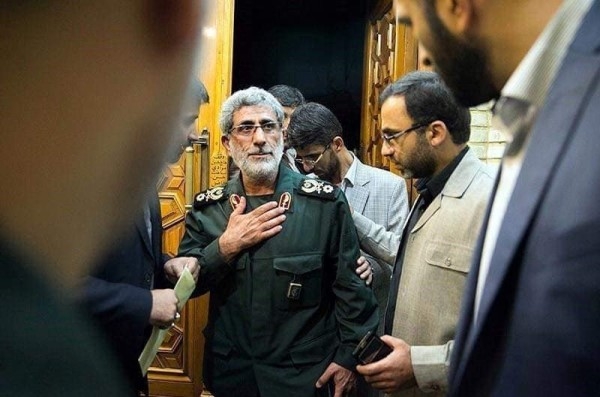
Political researcher Mujasha' Al-Tamimi commented on Wednesday (September 18, 2024) on the objectives of the secret visit of the commander of the "Quds Force" in the Iranian Revolutionary Guard, General Ismail Qaani, to the capital, Baghdad, which he arrived in yesterday, Tuesday.
Al-Tamimi told Baghdad Today, "The Iranians entered the crisis line between the forces of the Coordination Framework and Prime Minister Mohammed Shia al-Sudani from the first moments, and they succeeded in calming the crisis and accepting all parties to the vision of searching for a solution to this problem, but the crisis seems complicated and is linked to the concern of the traditional forces and major leaderships about their political future with the emergence of new young leaderships that could practice a generational displacement of them."
He said, "The visit also relates to the direct threat of Israeli Prime Minister Benjamin Netanyahu's government to carry out a ground invasion of Lebanon to remove the Radwan forces, which are Hezbollah's elite forces, from the Israeli border."
He added, "The axis of resistance believes that the Israeli side has been working for some time to achieve a security belt on the Lebanese border with northern Israel by seeking to empty the Lebanese border villages of their residents, but this does not solve the Israeli problem, but rather solves part of it, as it will prevent the danger of infiltration, i.e. Hezbollah carrying out something similar to October 7 and reassuring the Jewish settlers, but such an area is not solved by launching missiles and drones that reach deep into Israel."
The political researcher continued, "This position requires coordinating positions between the armed factions linked to the axis of resistance, especially since the visit coincided with Israel carrying out a cyber breach of Lebanese communications, the escalation of the crisis in Gaza, and the absence of political solutions to the Gaza crisis. Therefore, I do not think that Qaani will exhaust himself in the issue of the framework crisis because there are parties that can carry out the task."
Al-Tamimi added, "The most important and dangerous thing is to address the Gaza crisis and the Israeli provocations against the axis of resistance, especially after the scenarios of the Iranian response to the assassination of the head of the political bureau of Hamas, Ismail Haniyeh, in the heart of Tehran, have dissipated."
A political source reported yesterday, Tuesday (September 17, 2024), the arrival of the commander of the Iranian Quds Force, Ismail Qaani, to the Iraqi capital, Baghdad .
The source told Baghdad Today, "Qaani arrived in Baghdad on an unannounced visit, and immediately upon his arrival, he held meetings with political leaders in the capital."
He added, "Qaani met with the head of the Badr Organization, Hadi al-Amiri, the Secretary-General of the Asa'ib Ahl al-Haq Movement, Qais Khazali, and the commander of the Iraqi Hezbollah Brigades, Hussein al-Hamidawi .
Economist: The free mass is estimated at 70 trillion dinars and can be invested electronically

Economic expert Dr. Safwan Qusay confirmed today, Sunday, that there are about 70 trillion dinars of free money supply, pointing out the possibility of investing it through the transition to the electronic system in financial transactions.
Qusay told Al-Maalouma, “Focusing on investing in financial inclusion is accompanied by many benefits, the most prominent of which is withdrawing the free cash flow outside the banking system, which is estimated at about 70 trillion dinars, or an average of 2 million dinars for every Iraqi citizen.”
He added, "This amount could lead to an increase in liquidity in banks and increase their ability to grant through small and medium income-generating projects or by increasing the capacity for long-term strategic investment financing."
He pointed out that "Iraqi banks have the qualifications to switch to the electronic system, noting that "the transformation of the financial sector to the electronic system with credit cards will pave the way for attracting international investments and increasing confidence in the Iraqi economy."
"Our Country's Dream"... Al-Sudani Sends an "Important" Message to Gulf States Regarding the Path to Development
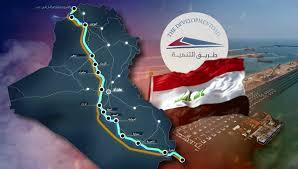
Prime Minister Mohammed Shia al-Sudani stressed that the drop in oil prices to less than $72 confirms the need to diversify the Iraqi economy, while he addressed a message to the Gulf countries regarding the path to development.
Al-Sudani said during a televised interview followed by "Al-Eqtisad News", "The federal administration's budget allows it to pay $8 for every barrel of oil produced, while contracts signed with the Kurdistan Regional Government give companies $26. This stagnation has affected production from the region and led to a delay in the resumption of the pipeline."
Baghdad has been unable to agree on how much to pay international oil companies operating in the north of the country for their production.
"We have to look at how we balance these issues. Do we look at the budget to see what we can do or do we try to look at prices?" he added.
“Closing the pipeline, which can carry nearly half a million barrels per day of oil from Kurdistan to the Turkish coast, would cost billions of dollars in lost revenue. However, restarting it would pose a dilemma for Iraq, which has failed to comply with OPEC+ production limits amid dire financial needs but has repeatedly said it will compensate for overproduction,” he said.
Al-Sudani said, "We are committed to abiding by OPEC decisions and maintaining the oil price in a way that achieves a balance between the interests of users and producers."
Pipeline problems
Turkey halted the pipeline in March last year after an arbitration court ordered it to pay Iraq $1.5 billion in compensation for transporting oil through it without Baghdad’s consent. Ankara, which claimed the pipeline was shut for repairs after two massive earthquakes in February, said in October it was ready for operations and that it was up to Iraq to resume flows.
But financial and legal issues have emerged, such as compensating companies for costs. International companies have said they also want to settle their overdue receivables — including $1 billion for oil produced between September 2022 and March 2023.
With exports halted, companies have begun producing some crude and selling it domestically. Iraqi officials have previously said this production has caused problems with compliance with quotas set by the Organization of the Petroleum Exporting Countries.
Iraq’s production cap is 4 million barrels a day, but it produced 4.32 million barrels a day last month, according to data compiled by Bloomberg. The country, along with some other OPEC+ members, will gradually lift those limits starting in December.
Al-Sudani is keen to “increase production in the long term after years of war and internal conflict that have affected Iraq’s oil industry. In August, BP signed a preliminary agreement to help boost production from the Kirkuk region. Iraq is also rehabilitating and modernizing damaged refineries to help reduce fuel imports.”
The Prime Minister continued, "Because of the wars and the blockade over the past four decades, Iraq has been late in exploiting the wealth we have of gas and oil properly. Now we are looking at how to exploit the new wealth we have and how to use it effectively."
Diversify the economy
But he said, "The drop in oil prices in London to around $72 a barrel - near their lowest levels since 2021 - underscores the need to diversify the economy."
Iraq is OPEC's largest oil producer after Saudi Arabia and derives the bulk of its revenues from exporting the commodity, and needs much higher prices to balance its budget.
The IMF has long said the country needs to develop its private sector, and that economic progress is being hampered by a huge public sector wage bill, with successive governments not doing enough to curb high wage increases.
Al-Sudani pointed out that "his administration is looking to invest about 40% of Iraq's oil revenues to boost the non-oil sector," adding that "the planned trade corridor extending from Basra Governorate in southern Iraq to Turkey and then to Europe was a 'dream' for his country, and he is looking to the Gulf states to help finance the project, which is supposed to cost $17 billion."
Al-Nusairi identifies the challenges facing Iraqi private banks and opportunities for banking reform
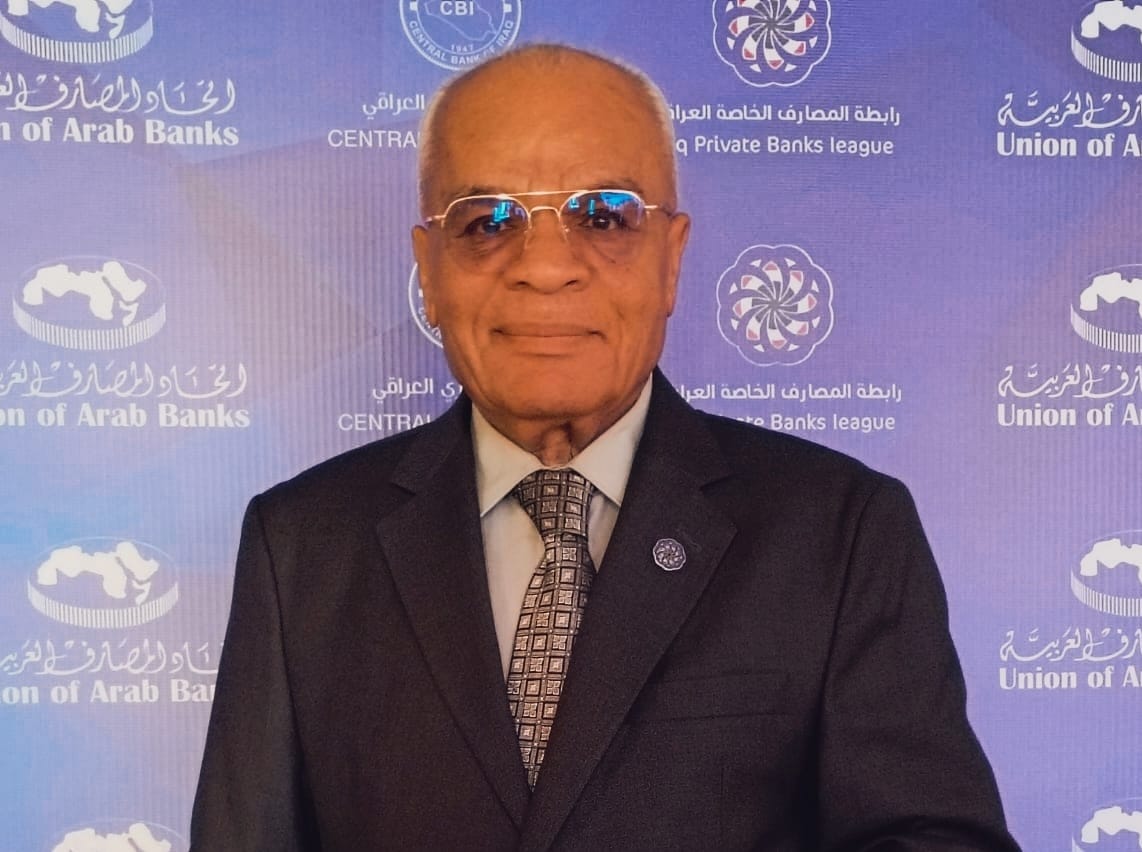
Iraqi private banks suffer from many challenges and work obstacles, and face wide crises and risks due to economic instability due to the challenges of instability in the financial and monetary system, shortcomings in the investment environment, and deficits in the balance of payments and trade balance.
Al-Nusairi pointed out that the private banking sector in Iraq faces operational challenges in addition to those mentioned above, most notably the US sanctions and restrictions imposed on 51% of the total private banking sector in Iraq and the prevention of 28 of them from using the US dollar in banking transactions, which affected their local and international activities and harmed the national economy.
He explained that the most important obstacles facing banks currently are technical, financial and administrative, especially in the procedures, instructions and decisions of digital transformation, which requires providing full support for this transformation process and using electronic payment tools in government, mixed and private institutions, and setting a time frame for the complete transition from the use of paper money to electronic payment.
2- Activating the Central Bank’s financing initiatives.
3- Increasing cooperation between private banks and the Central Bank in discussing decision-making related to supporting and developing banking work.
4- Determining the contribution of foreign capital to Iraqi banks.
6- Support from the government and the Central Bank to private banks in foreign institutions and banks.
Al-Sudani directs the preparation of guidelines to ensure fair competition in the banking sector
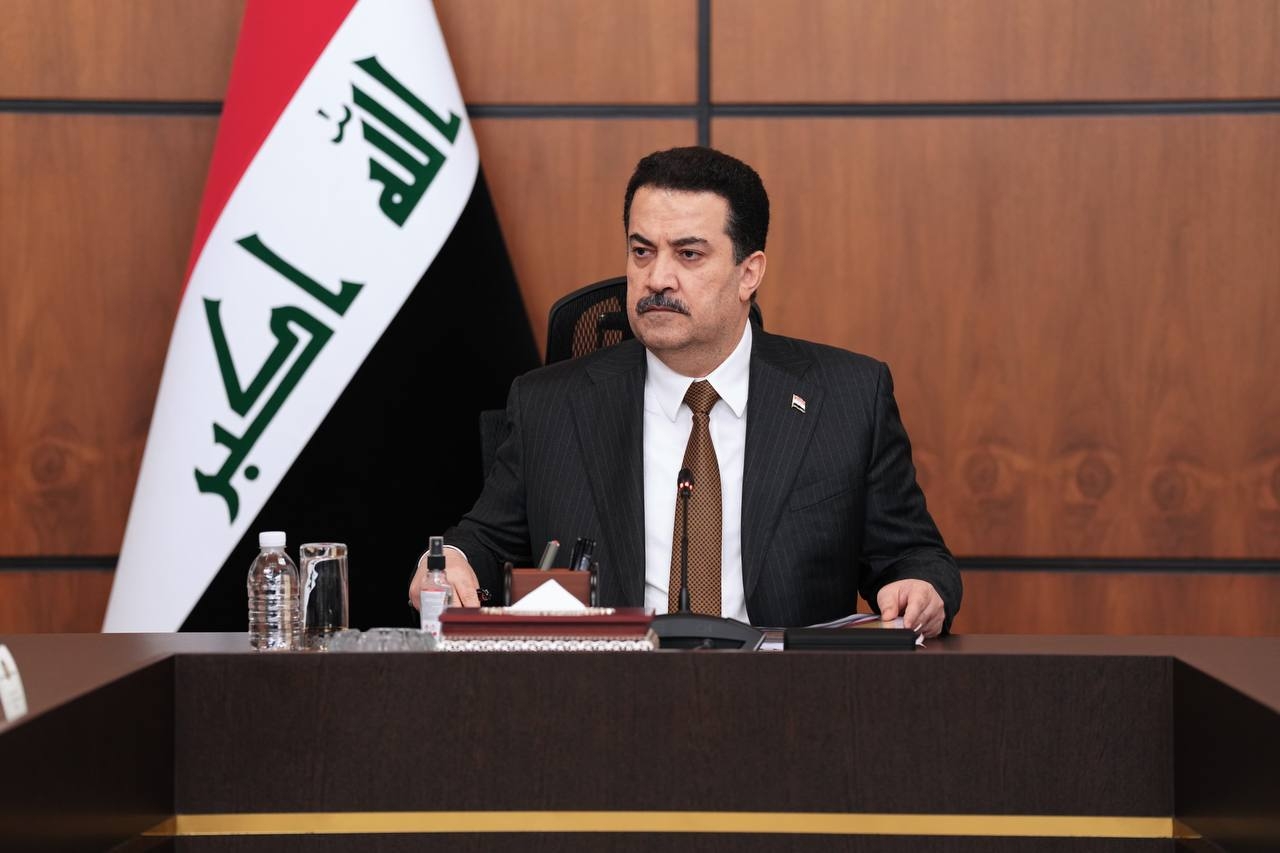
Prime Minister Mohammed Shia Al-Sudani directed, today, Wednesday (September 18, 2024), the preparation of guidelines to ensure fair competition in the banking sector.
A government source told Baghdad Today that "in the context of the objectives of the government program and within the efforts to activate the strategies concerned with developing banking services and their quality, the Prime Minister issued a directive to the Council of Competition Affairs and Anti-Monopoly, affiliated with the Prime Minister's Office, to cooperate with the supervisory and technical authorities in the Central Bank of Iraq, to prepare guidelines in accordance with the Competition and Anti-Monopoly Law, in a way that ensures fair competition in the banking sector and enhances harmony and agreement in implementing public policies in this field."
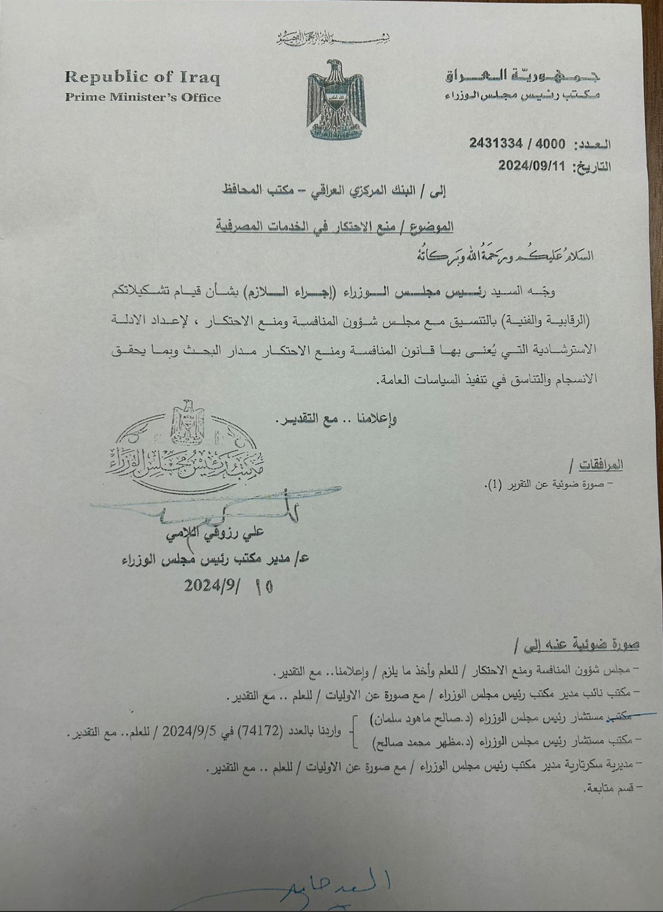
Hezbollah announces death toll and injuries from Pager bombings: Ready to defend Lebanon

The Lebanese Hezbollah announced, on Tuesday, the death toll and injuries as a result of the explosions of the messaging devices known as "pagers".
A statement by the party received by Shafaq News Agency stated that, "At approximately 3:30 pm on Tuesday, a number of messaging devices known as "pagers" exploded, which are owned by a number of workers in various Hezbollah units and institutions. These explosions, the causes of which are still unknown, led to the martyrdom of a girl and two brothers, and the injury of a large number of people with various injuries."
He pointed out that "the competent agencies in Hezbollah are currently conducting a wide-ranging security and scientific investigation to determine the reasons that led to these simultaneous explosions, and the medical and health services are also treating the wounded and injured in a number of hospitals in various Lebanese regions."
The party called for "paying attention to the rumors and false and misleading information that some parties are spreading in a way that serves the psychological warfare in the interest of the Zionist enemy, especially since this is accompanied by the speeches of intimidation and threats to the Zionist enemy and what it calls changing the situation in the north. He stressed that "the resistance at all its levels and various units is at the highest level of readiness to defend Lebanon and its steadfast people."
Security sources and eyewitnesses reported that hundreds of Hezbollah members in Lebanon were seriously injured after the explosion of the wireless communication devices they were carrying in southern Beirut.
Meanwhile, the Iranian Mehr News Agency said that the Iranian ambassador to Lebanon, Mojtaba Amani, was injured as a result of the explosion of communication devices in Lebanon.
Is the decline in oil prices related to the rise in exchange rates? An "important" clarification from Al-Alaq
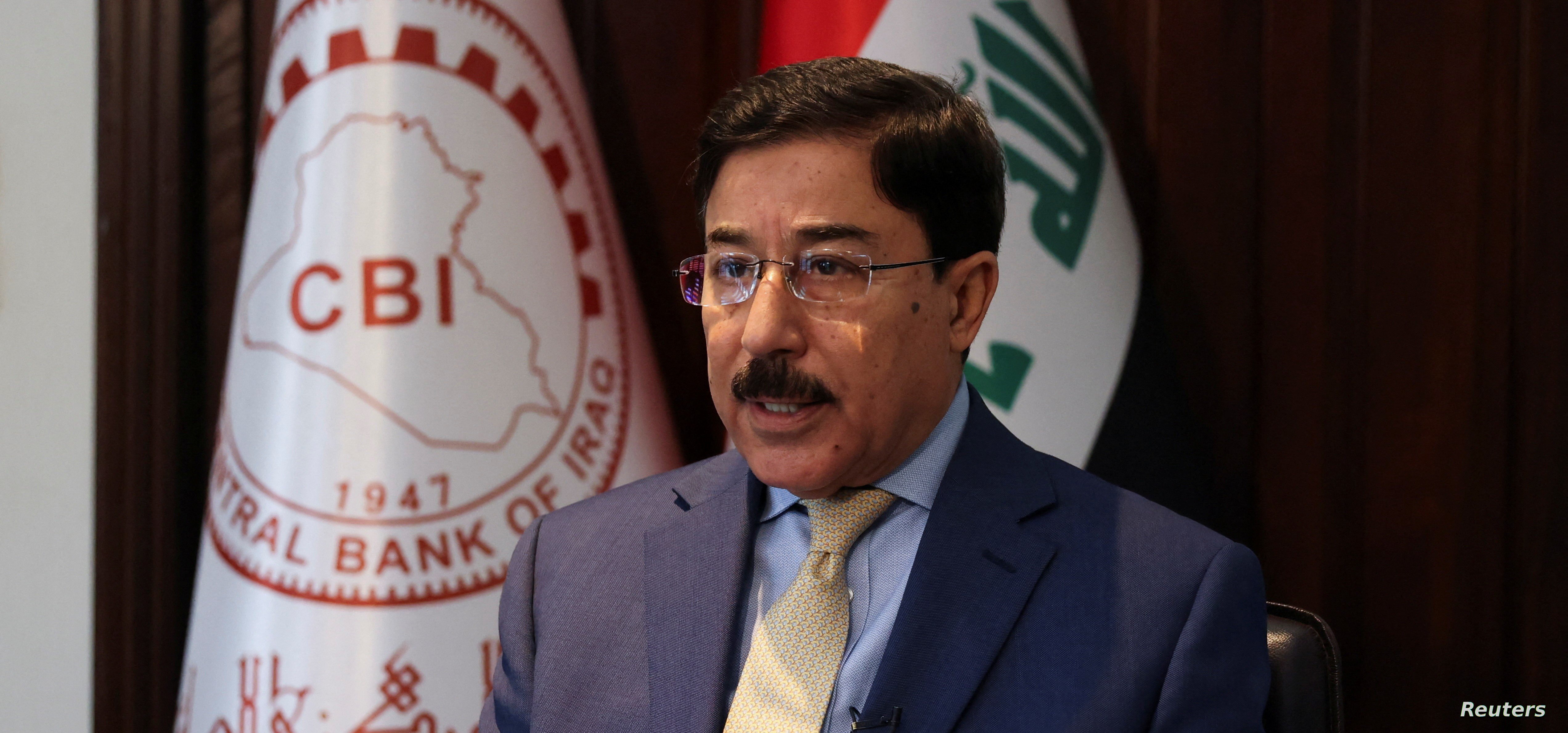
The Governor of the Central Bank of Iraq, Ali Al-Alaq, announced today, Wednesday, that all transfers are subject to auditing processes, while he indicated that the decline in oil prices has nothing to do with the rise in the exchange rate.
Al-Alaq told the official agency, which was followed by "Al-Eqtisad News", that "the Central Bank provides the dollar at the official price to all commercial and personal channels, travelers, and all types of operations that represent legitimate activities, operations, and requests."
He pointed out that "any price outside the country is a price that only indicates the existence of abnormal operations that attempt to deviate from the official and legal system and the correct fundamental channels," stressing the need to "focus on the amount of sales carried out by the Central Bank at the official price and those seeking the dollar, whether they are traders, importers, individuals or travelers."
He pointed out that "methods have been put in place for each channel to secure the provision of dollars on the one hand, and a very large degree of oversight to verify the integrity of the pre-operations before they are implemented," noting that "this is a major shift in foreign transfer operations, as they were previously audited at a later stage, and today all transfer operations are not carried out or implemented except after they are subject to the auditing process."
He explained that "the decline in the price of oil has nothing to do with the rise in the exchange rate because Iraq has foreign currency reserves that enable it to defend the exchange rate."
No comments:
Post a Comment